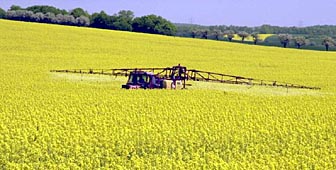Syngenta under pressure to dump “deadly” pesticide

A Swiss group is trying to force the biotech firm, Syngenta, to stop selling a pesticide blamed for damaging the health of farmers.
The Berne Declaration used the recent International Agrochemical Congress in Basel to highlight studies which, it says, prove that a Syngenta pesticide is too dangerous to be used.
It says farmers and plantation workers who used the pesticide were found to suffer severe health problems, and many deaths were caused by exposure to the substances.
But the Basel-based Syngenta dismisses the claims saying its product, Gramoxone, was safe if used correctly.
At the centre of the debate is the substance paraquat, which is sold by Syngenta as Gramoxone. The Berne Declaration launched an international campaign in April to have the pesticide banned.
“When a plantation worker has to spray this herbicide for the whole day for the whole year, he will experience severe health effects that could start with losing nails, headaches and nose bleeding.
Skin burns
“The farmers could also experience severe burns on their skin necessitating in some cases skin transplantations,” Francois Meienberg, from the Berne Declaration, told swissinfo.
“Worldwide there are many deaths not only from using the substance, but also from children who drink this by accident or who use the herbicide in order to commit suicide,” he continued.
According to a 1992 study by the World Health Organisation, paraquat causes the deaths of some 20,000 people each year.
Syngenta denies that Gramoxone is unsafe, arguing that it has been on the market for more than 35 years.
“It is very well tested and if used correctly, according to instructions, it is a very safe product for the farmers and for the environment,” Syngenta spokesman Rainer Mielecki told swissinfo.
“We continuously look into the product with the regulatory authorities. We support farmers and the handling of the product through extensive stewardship programmes. And we will continue to do so.”
Banned
The Berne Declaration argues that there is no completely safe way to handle Gramoxone. It points out that European countries including Sweden, Finland, Denmark and Austria have banned the pesticide.
“We are sure that a safe use of this highly toxic product is not possible,” Meienberg said. “It is certainly not possible in developing countries where we know that the high standards for protection – suits, gloves, glasses – are not in place and are not used.”
The Berne Declaration and Syngenta are also at loggerheads over whether the pesticide damages or helps the environment.
Mielecki noted that one upside of the pesticide is that it “prevents tilling and so stops erosion”. The Berne Declaration says ist high toxicity makes it harmful to the environment.
Atrazin
The Berne Declaration is also pushing for a complete ban on another Syngenta pesticide that has been on the market for the past 40 years. “We think that Atrazin leads to a lot of environmental problems and it would be a good thing for Syngenta to stop the production of Atrazin,” Meienberg said.
A study by the United States’ Berkeley University reportedly found that Atrazin caused mutations in frogs when it entered water supplies.
Atrazin is “supported by more than 800 studies and we continuously to look into it,” Syngenta’s Ryan responded. “And it has great benefits for farmers in many countries – and it is used extensively,” he continued.
Gramoxone is one of Syngenta’s most profitable products – it generates SFr450 million (€300 million) per year – and the firm has no plans to review the pesticide, or Atrazin, as result of pressure from the Berne Declaration.
by Samantha Tonkin and Vanessa Mock

In compliance with the JTI standards
More: SWI swissinfo.ch certified by the Journalism Trust Initiative
You can find an overview of ongoing debates with our journalists here. Please join us!
If you want to start a conversation about a topic raised in this article or want to report factual errors, email us at english@swissinfo.ch.